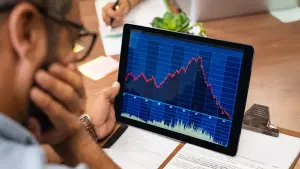The world of financial platforms is so complex that the concepts and terms can sometimes be confusing. The most discussed and important categories are the foreign exchange market and over-the-counter trading. These two types differ fundamentally in their organization and the way in which transactions are executed. Although both are an integral part of the financial system, it is crucial to understand the differences in order to participate successfully in trading.
What is the stock market and the over-the-counter market?
First of all, it is important to understand the basics. An exchange is an organized trading platform where buyers and sellers meet to make transactions according to predetermined rules. It is a system in which transactions take place in various financial instruments, including stocks, bonds, derivatives and other securities. Transactions on the stock exchange are made through intermediaries: brokers who provide access to the market.

The over-the-counter (OTC) market is an unorganized network in which transactions take place directly between participants, without the intervention of official trading platforms. These agreements do not require intermediaries and can be negotiated via electronic systems or verbal agreements. Unlike the stock market, there is no central pricing mechanism, making the market more flexible but also riskier.
Key differences between stock markets and over-the-counter markets
 To better understand the differences between the stock market and the OTC market, it is important to consider a number of key factors that influence the structure, processes and participants.
To better understand the differences between the stock market and the OTC market, it is important to consider a number of key factors that influence the structure, processes and participants.
Location and agent
On the stock exchange, all trading transactions are conducted in a centralized system, and the exchange of goods or assets takes place via official intermediaries. Participation in exchange transactions requires access through brokers or other financial institutions, which also ensures the transparency of the transactions. The platform monitors all transactions and ensures that the terms of the transaction are adhered to and standards are maintained.
In over-the-counter trading, however, the contracts are concluded directly between the buyer and the seller. While this offers participants more flexibility, it also leads to higher risks. Without intermediaries or supervision, there is no guarantee that the contractual terms will be met.
Transparency of information
One of the most important features of the stock exchange is that all transactions take place in an open format and that information on prices, volumes, rates and other important parameters is accessible to all participants. This transparency ensures competition, reduces manipulation and increases liquidity.
The situation is different in the over-the-counter market. Deals are often concluded without this being made public, which makes the market closed and less transparent. For example, participants can agree on the price and terms of the deal without other traders and investors being aware of it.
Liquidity and risks
The stock exchange is known for its high liquidity. Transactions are executed at pre-determined prices, which gives participants confidence that they can complete a transaction quickly. High liquidity reduces the risk of significant losses and also increases the attractiveness of the market for large investors.
In contrast to the stock market, the OTC market is generally characterized by low liquidity. Agreements can be concluded on terms that are favorable or unfavorable to the parties, but the speed of execution and the size of the agreements can vary considerably. The low liquidity and price volatility make the OTC market riskier and more difficult for beginners.
Regulation and safety
One of the main advantages of the stock exchange is the strict regulation. All contracts on the exchange are executed via a central platform, so you can manage all aspects of trading and minimize the risks for participants. At the same time, the OTC market is not as strictly regulated, which can lead to price manipulation and fraud.
How stock exchanges and the OTC market work
The stock exchange has clearly defined rules and operates according to a centralized system, where each participant must adhere to certain standards. One of the most important aspects is meeting strict criteria for listing shares or other securities. In order to be listed, a company must meet strict requirements, such as minimum capitalization, reporting, transparency and other parameters.
Examples of such exchanges are the largest financial centers in the world, such as the New York Stock Exchange (NYSE), the London Stock Exchange (LSE) and the Moscow Stock Exchange. These institutions not only provide a liquidity market, but also protect the interests of investors.
Unlike the stock exchange, the over-the-counter market operates on the basis of free agreements between participants. There is no central body that regulates and monitors the trading. This makes such transactions more flexible, but also more vulnerable to manipulation and fraud. The system uses various mechanisms to determine transaction prices and terms, including electronic trading platforms or verbal agreements between the parties.
Which stocks are traded on the over-the-counter market?
Not all companies can or want to meet the strict requirements of a stock exchange listing: OTC offers an excellent opportunity for small and medium-sized companies or start-ups that want to raise capital but do not want or are unable to meet the requirements of a stock exchange. Trading in the shares of these companies often involves a higher risk, as there is no guarantee of price stability. However, this can be an attractive opportunity for investors to achieve high returns.
Over-the-counter shares are usually shares of small or emerging companies that cannot or do not want to be listed on larger platforms. This can be particularly advantageous for risk-averse investors who are prepared for possible major market fluctuations.

Conclusion
 When choosing between shares and OTC markets, you should consider a number of important factors: risk level, liquidity, legal requirements and individual preferences. The stock exchange is suitable for those who value stability, high liquidity and safety standards. This is an ideal place for large and medium-sized investors, but also for those who are not prepared to risk their investments.
When choosing between shares and OTC markets, you should consider a number of important factors: risk level, liquidity, legal requirements and individual preferences. The stock exchange is suitable for those who value stability, high liquidity and safety standards. This is an ideal place for large and medium-sized investors, but also for those who are not prepared to risk their investments.
For those willing to take on riskier investments and aren’t afraid of volatility, the OTC market can be a good way to profit from lesser-known and less liquid investments.
 en
en  ru
ru  de
de  ar
ar  es
es  nl
nl  hi
hi  fr
fr  it
it  pt
pt  el
el 










